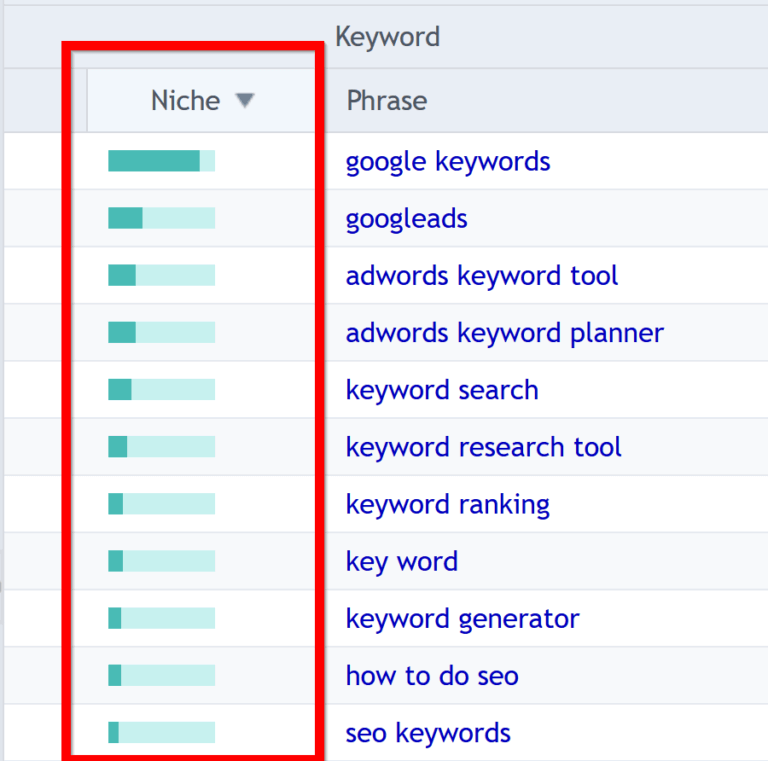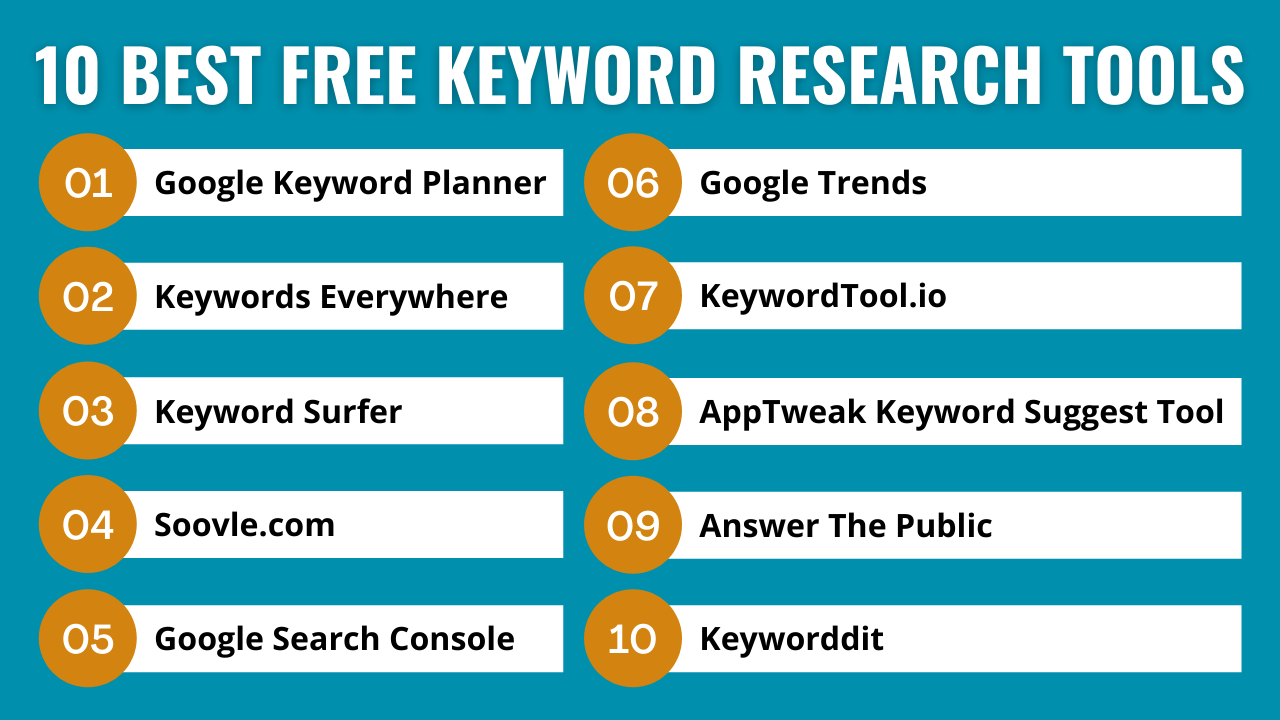Tools for keyword research include Google Keyword Planner and SEMrush. These tools help identify valuable keywords for SEO.
Keyword research is crucial for optimizing your website’s content. It helps you understand what your audience is searching for. Using the right tools can significantly improve your SEO strategy. Google Keyword Planner offers insights into search volume and competition. SEMrush provides a comprehensive analysis of keywords and competitors.
Both tools are user-friendly and essential for digital marketing. Effective keyword research drives organic traffic and enhances online visibility. Consistently updating your keyword strategy keeps your content relevant. Investing time in keyword research ensures you target the right audience. Utilize these tools to stay ahead in the competitive digital landscape.
The Importance Of Keyword Research In Seo
Keyword research is the backbone of any successful SEO strategy. It helps you understand what your target audience is searching for. By identifying the right keywords, you can drive more traffic to your website. This leads to higher engagement and better conversion rates.
Fueling Content Strategies
Keyword research fuels your content strategies by providing insights into popular search terms. Knowing what people are searching for helps you create relevant content. This increases your chances of ranking higher on search engines.
Here are some ways keyword research can fuel your content strategies:
- Identify trending topics
- Optimize existing content
- Discover new content opportunities
Using keyword research tools, you can find high-traffic keywords and integrate them into your content. This ensures your content is both engaging and SEO-friendly.
Understanding User Intent
Understanding user intent is crucial for effective SEO. Keyword research helps you decipher what users really want. This can be informational, navigational, or transactional.
Here are the types of user intent:
- Informational: Users are looking for information or answers.
- Navigational: Users want to find a specific website or page.
- Transactional: Users are ready to make a purchase or take action.
By understanding user intent, you can tailor your content to meet their needs. This improves user experience and increases your chances of conversion.
Here’s a simple table to understand the types of user intent and examples:
| User Intent | Example |
|---|---|
| Informational | “How to bake a cake” |
| Navigational | “Facebook login” |
| Transactional | “Buy running shoes” |
Using keyword research tools, you can identify keywords associated with each type of user intent. This helps you create content that aligns with what users are looking for.
Starting With The Basics: What Are Keywords?
Understanding keywords is crucial for effective keyword research. Keywords are words or phrases people use to search for information online. These terms are essential in connecting users with relevant content.
Keywords guide search engines to show your content to the right audience. They play a vital role in search engine optimization (SEO). Using the right keywords helps improve your website’s visibility.
Types Of Keywords: Short-tail Vs Long-tail
| Short-Tail Keywords | Long-Tail Keywords |
|---|---|
| One or two words | Three or more words |
| High search volume | Low search volume |
| High competition | Low competition |
| General topics | Specific topics |
Short-tail keywords are broad and often competitive. Examples include “shoes” or “travel”. These keywords attract a large audience but may not always be targeted.
Long-tail keywords are more specific. Examples include “running shoes for women” or “best travel destinations for families”. These keywords draw a smaller, more focused audience. They often lead to higher conversion rates.
The Role Of Keywords In Search Engine Rankings
Keywords influence your search engine rankings. They help search engines understand your content’s relevance. Proper keyword use can improve your website’s ranking on search engine results pages (SERPs).
- Include keywords in your title and meta descriptions.
- Use keywords in headings and subheadings.
- Incorporate keywords naturally within your content.
Remember, keyword stuffing can harm your rankings. Focus on providing valuable content. Use keywords to enhance the reader’s experience.
Popular Keyword Research Tools And Their Features
Keyword research is the backbone of any successful SEO strategy. Using the right tools can help you discover high-ranking keywords. These tools offer insights into search volume, competition, and trends. Below are some popular keyword research tools and their standout features.
Google Keyword Planner: A Classic Choice
Google Keyword Planner is a free tool from Google. It’s great for finding keywords directly from Google’s database. You can see monthly search volumes and competition levels.
- Search Volume Data: View how often keywords are searched.
- Competition Analysis: Determine how competitive keywords are.
- Ad Performance: Get insights for Google Ads campaigns.
This tool is especially useful for businesses using Google Ads. It helps you plan and refine your advertising strategies.
Semrush: A Comprehensive Toolkit
SEMrush offers a wide range of SEO tools. It’s known for its comprehensive features and user-friendly interface. SEMrush is ideal for both beginners and experts.
- Keyword Magic Tool: Find thousands of keyword ideas in seconds.
- Competitive Analysis: See what keywords your competitors are using.
- Backlink Analysis: Get insights into backlink profiles.
- Site Audit: Identify and fix on-page SEO issues.
SEMrush also provides in-depth reports. These reports help you track your SEO performance over time.
| Tool | Key Features |
|---|---|
| Google Keyword Planner |
|
| SEMrush |
|
Both tools offer unique benefits. They can help you improve your SEO strategy. Choose the one that fits your needs best.

Credit: backlinko.com
Advanced Tools To Elevate Your Keyword Game
For effective SEO, keyword research is vital. Using advanced tools can elevate your keyword game significantly. These tools offer insights into competitive analysis and valuable keyword suggestions.
Ahrefs: For Competitive Analysis
Ahrefs is a powerful tool for competitive analysis. It helps you understand your competitors’ keyword strategies. With Ahrefs, you can discover which keywords your competitors rank for. This helps you target similar keywords and outrank them.
Key features of Ahrefs include:
- Comprehensive keyword analysis
- Backlink analysis
- Site audits
- Content gap analysis
Use Ahrefs to identify high-performing keywords. Analyze their difficulty and search volume. This data helps you craft a strong SEO strategy.
Moz Keyword Explorer: For Keyword Suggestions
Moz Keyword Explorer offers extensive keyword suggestions. It provides insights into keyword difficulty and potential. This tool helps you discover long-tail keywords that are less competitive.
Key features of Moz Keyword Explorer include:
- Keyword difficulty scores
- Monthly search volume
- Organic CTR (Click-Through Rate)
- Priority score combining various metrics
Moz Keyword Explorer also allows you to prioritize keywords based on their potential. This helps you focus on keywords that can bring the most traffic.
Both Ahrefs and Moz Keyword Explorer are essential for thorough keyword research. They help you uncover valuable insights and refine your SEO strategy.
Utilizing Free Tools For Keyword Discovery
Finding the right keywords is crucial for SEO success. Free tools can help you discover effective keywords without breaking the bank. These tools offer various features that can meet your specific needs. Below, we will explore two such tools that are both user-friendly and budget-friendly.
Ubersuggest: A Budget-friendly Option
Ubersuggest is a fantastic tool for those on a budget. This tool offers a lot of features for free. It helps you find keywords that people are searching for online. Ubersuggest provides data on search volume, competition, and trends. This makes it easier to choose the best keywords for your content.
- Search Volume: Find out how many people search for a keyword each month.
- Competition: See how hard it is to rank for a keyword.
- Trends: Discover if a keyword is becoming more or less popular.
Ubersuggest also offers suggestions for related keywords. This can help you expand your list of target keywords. Use these insights to optimize your content and improve your search engine rankings.
Keyword Tool.io: For Question-based Keywords
Keyword Tool.io is perfect for finding question-based keywords. This tool generates a list of questions related to your main keyword. These questions are what people are asking online. Using these keywords can help you create content that answers people’s questions.
- Comprehensive List: Get a wide range of question-based keywords.
- Long-Tail Keywords: Focus on more specific search queries.
- User Intent: Understand what users want to know.
Keyword Tool.io pulls data from various search engines. This includes Google, YouTube, Bing, and more. You can tailor your content to meet the needs of different platforms.
Both Ubersuggest and Keyword Tool.io offer valuable insights for keyword research. These tools can help you create better content and improve your SEO. Start using them today to discover effective keywords and boost your online presence.

Credit: www.shoutmeloud.com
Analyzing Keywords For Better Results
Analyzing keywords is crucial for better SEO results. This process helps you understand which keywords can drive the most traffic. You can focus your efforts on the right keywords and avoid wasting time on the wrong ones. Let’s dive into some key aspects of this analysis.
Search Volume And Competition: Finding The Balance
Search volume and competition are key factors in keyword research. Search volume indicates how often a keyword is searched. Competition shows how many websites are vying for the same keyword.
Finding a balance between search volume and competition is essential. A high search volume with low competition is ideal. You can use tools like Google Keyword Planner to get these insights. Aim for keywords that have a decent search volume but aren’t too competitive.
| Keyword | Search Volume | Competition |
|---|---|---|
| Keyword A | 10,000 | High |
| Keyword B | 5,000 | Medium |
| Keyword C | 1,000 | Low |
Keyword Difficulty And Serp Analysis
Keyword difficulty measures how hard it is to rank for a keyword. Tools like Ahrefs and SEMrush can help you find this metric. Aim for keywords with a low difficulty score for easier ranking.
SERP analysis involves examining the Search Engine Results Pages (SERP) for a keyword. Look at the top-ranking pages and analyze their content. Notice the type of content, the keywords they use, and the length of the articles. This helps you understand what you need to beat the competition.
- Use tools to check keyword difficulty.
- Analyze top-ranking pages for your target keywords.
- Focus on the content type and structure.
Combining keyword difficulty and SERP analysis gives you a clear picture. You can then create content that stands a better chance of ranking high.
Integrating Keywords Into Your Content
Integrating keywords into your content is crucial for SEO success. Proper keyword placement can drive more traffic to your site. Let’s explore how to do it effectively.
Best Practices For Keyword Placement
Placing keywords in the right spots is essential. Here are some best practices:
- Title Tags: Include your primary keyword in the title.
- Headings: Use keywords in H1, H2, and H3 headings.
- First 100 Words: Mention your primary keyword early.
- Meta Descriptions: Add keywords in meta descriptions.
- URL: Use short, keyword-rich URLs.
- Image Alt Text: Optimize images with relevant keywords.
Avoiding Keyword Stuffing And Penalties
Keyword stuffing can harm your SEO. Avoid penalties by following these tips:
- Natural Flow: Ensure your content reads naturally.
- Synonyms: Use synonyms and related terms.
- Keyword Density: Keep keyword density below 2%.
- User Experience: Prioritize the reader’s experience.
- Variety: Mix up your keywords to avoid repetition.
By following these steps, you can integrate keywords effectively.
Measuring The Impact Of Your Keyword Strategy
Once you’ve chosen your keywords, it’s crucial to measure their impact. This helps you understand if your strategy works or needs adjustments. Focus on tracking rankings and performance and adjusting your strategy based on data.
Tracking Rankings And Performance
Tracking keyword rankings tells you where your website stands in search results. Use tools like Google Analytics and SEMrush for this.
- Google Analytics: Offers insights into your website’s traffic and keyword performance.
- SEMrush: Provides data on keyword rankings and competitor analysis.
Check your keyword rankings regularly. Keep an eye on metrics such as:
| Metric | Importance |
|---|---|
| Search Volume | Shows how often a keyword is searched. |
| Click-Through Rate (CTR) | Indicates the percentage of users clicking your link. |
| Conversion Rate | Measures the percentage of visitors who take a desired action. |
These metrics help you understand the effectiveness of your keyword strategy.
Adjusting Your Strategy Based On Data
Data helps you make informed decisions. If a keyword isn’t performing, consider these adjustments:
- Keyword Refinement: Change underperforming keywords to more relevant ones.
- Content Optimization: Improve content around your keywords for better engagement.
- Competitor Analysis: Study competitors to identify their successful keywords.
Make these adjustments regularly. This ensures your keyword strategy stays effective and current.
Always be ready to adapt. The digital landscape changes quickly, and so should your strategy.
Emerging Trends In Keyword Research
Keyword research is evolving at a rapid pace. To stay ahead, understanding emerging trends is crucial. These trends can shape your SEO strategy and boost your visibility. Here, we explore some of the key trends in keyword research.
The Rise Of Voice Search And Its Impact
Voice search is becoming increasingly popular. People use voice assistants like Alexa and Siri more often. This change impacts keyword research significantly.
Voice search queries are usually longer and conversational. They often include question words like “who,” “what,” “where,” “when,” and “how.” Optimizing for these keywords can improve your chances of ranking higher in search results.
Here are some tips for optimizing for voice search:
- Use natural, conversational language.
- Incorporate long-tail keywords.
- Answer common questions related to your niche.
Semantic Search And User-focused Optimization
Semantic search aims to understand the user’s intent behind a query. It focuses on the meaning of the words rather than just matching keywords. This shift requires a different approach to keyword research.
Here are some strategies for semantic search:
- Create content that answers user questions.
- Use related terms and synonyms.
- Focus on topics rather than individual keywords.
User-focused optimization means creating content that meets user needs. It involves understanding what users are searching for and providing relevant answers. This approach can improve user engagement and boost your SEO performance.
To optimize for user intent, consider the following:
- Identify common user queries.
- Create detailed, informative content.
- Use structured data to provide clear answers.
These emerging trends in keyword research can give you a competitive edge. By adapting to these changes, you can enhance your SEO strategy and achieve better results.

Credit: surfsideppc.com
Frequently Asked Questions
What Is The Best Tool For Keyword Research?
The best tool for keyword research is Ahrefs. It offers comprehensive data, accurate search volumes, and insightful keyword suggestions.
Is The Google Keyword Tool Free?
Yes, Google’s Keyword Planner tool is free. You need a Google Ads account to access it.
Is Google Analytics A Keyword Research Tool?
No, Google Analytics is not a keyword research tool. It tracks website traffic and user behavior. Use tools like Google Keyword Planner for keyword research.
How Do I Find Good Research Keywords?
Use keyword research tools like Google Keyword Planner. Analyze competitor websites. Focus on high search volume, low competition keywords. Use long-tail keywords for specificity. Regularly update and refine your keyword list.
Conclusion
Mastering keyword research tools can boost your SEO strategy significantly. These tools help identify high-impact keywords. Use them to enhance your content’s visibility and attract more organic traffic. Regularly update your keyword list to stay competitive. Investing time in keyword research will yield long-term benefits for your website’s growth.



